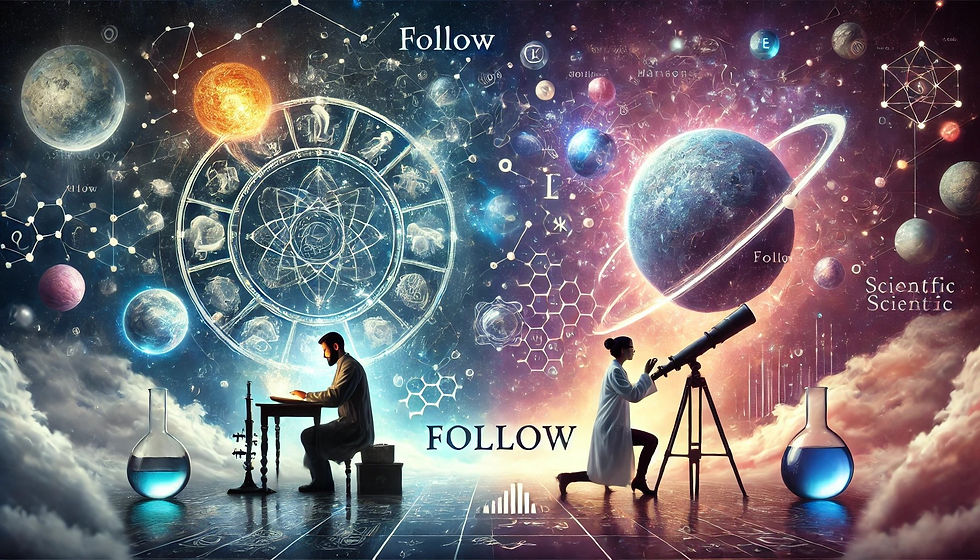FOLLOW - Astrology vs Science
- Feb 23, 2025
- 3 min read

In the ancient town of Vedanagar, where traditions ran deep but modern ideas steadily seeped through, two families stood as symbols of opposing beliefs. The Sharmas, devoted astrologers for generations, firmly believed that the stars dictated one’s destiny. The Mehtas, intellectual skeptics, prided themselves on reason, science, and logic, rejecting anything they deemed unproven superstition.
The families were cordial neighbors, yet a silent rivalry had persisted between them for decades. This rivalry intensified when their children, Aryan Sharma and Kavya Mehta, grew up as childhood friends, only to be separated by their families' convictions. The Sharmas frequently warned Aryan that associating with the Mehtas could lead him astray, while the Mehtas often dismissed Aryan’s family as relics of an outdated era.
As the years passed, Aryan followed in his family’s footsteps, becoming a respected astrologer. Kavya, on the other hand, pursued astrophysics, viewing celestial bodies through the lens of science rather than fate. Despite their differences, fate—or coincidence—brought them together again when they both ended up in Mumbai for their respective careers.
One evening, after years of silence, Aryan and Kavya met at an old café they had often visited as children. Their conversation began cautiously but soon blossomed into a deep discussion about beliefs. Aryan shared stories of people who had found direction through astrology, while Kavya argued how people should take control of their own destiny instead of relying on cosmic predictions.
Neither convinced the other, yet they found themselves drawn to each other. As their meetings became frequent, their bond deepened, and love took root despite their ideological differences.
However, challenges awaited them. When Aryan’s parents discovered his closeness to Kavya, they consulted his birth chart and declared that their union was doomed. Aryan was torn—he loved Kavya, but his belief in astrology was unwavering. On the other side, Kavya’s parents scoffed at the idea of their daughter being involved with someone who believed in ‘irrational prophecies.’
The tension escalated when Kavya’s father fell gravely ill. The doctors struggled to diagnose his condition, and in a desperate moment, Aryan suggested consulting an astrologer known for medical astrology. Despite her resistance, Kavya relented, willing to try anything. The astrologer pinpointed a period of planetary transition that hinted at an unusual but reversible condition. Taking it as a vague clue, Kavya persuaded the doctors to run a specific test, leading to the discovery of a rare but treatable disorder. Her father recovered, but Kavya remained unconvinced that astrology had anything to do with it. To her, it was mere coincidence.
Still, something shifted within her. She realized that even if she did not believe, it did not mean she had the right to belittle those who did. Aryan, too, learned an important lesson—faith should never be imposed. He decided that while he would continue to practice astrology, he would never expect Kavya to change her beliefs.
They chose love over ideology, understanding that peace lay in mutual respect, not in proving who was right. When they married, Aryan’s family performed rituals based on his birth chart, while Kavya’s family simply saw it as a joyful occasion without cosmic influence. Their union symbolized harmony, proving that conviction in one's beliefs—be it astrology or science—should be embraced with sincerity, not forced upon others.
Years later, their daughter, Maya, grew up in a home where both viewpoints coexisted. She listened to her father read horoscopes and watched her mother study the mysteries of the universe through a telescope. One day, she asked, “So, what should I believe?”
Aryan smiled and said, “Follow what speaks to your heart, and never mock what speaks to someone else’s.”
Kavya nodded in agreement. “Happiness isn’t in proving others wrong. It’s in respecting differences and choosing peace over conflict.”
And so, in Vedanagar, where once two families stood divided, a new chapter was written—one where belief and skepticism walked hand in hand, proving that the stars and free will could coexist without war.




Comments